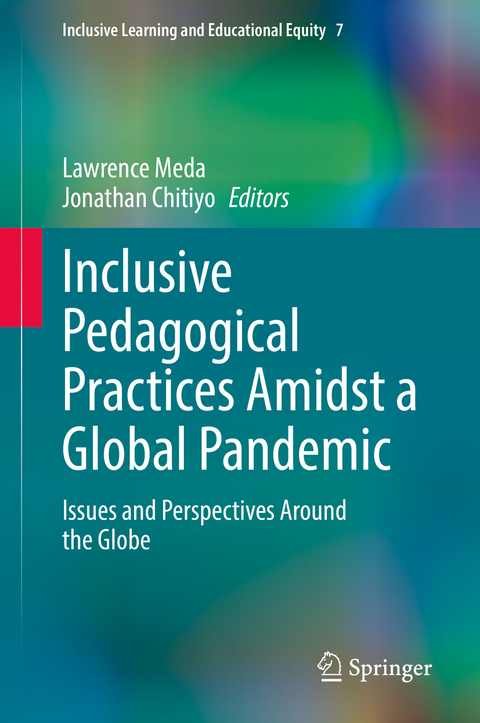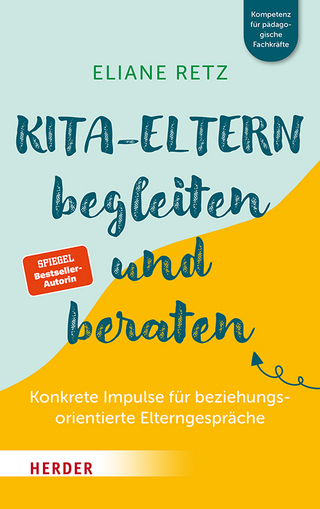
Inclusive Pedagogical Practices Amidst a Global Pandemic
Springer International Publishing (Verlag)
978-3-031-10641-5 (ISBN)
This book addresses the current issues of inclusive education during the time of the global pandemic of COVID-19. It offers inclusive pedagogical strategies and approaches for teachers and instructors to cater for the diverse learning needs of children in the midst of the pandemic. The work explores different ways in which students in different contexts across the globe are being accommodated and shows how inclusion is being implemented. It draws on a range of theoretical frameworks and research projects to provide multiple perspectives on inclusive pedagogical practices.
Dr Lawrence Meda holds a PhD in Curriculum Studies. He is currently working as an Associate Professor and Chair of the Education Studies Department in the College of Education at Zayed University, Dubai, United Arab Emirates. He has published in national and international journals and supervised postgraduate students. His main research interests are in Inclusive Education, Curriculum Studies, Educational Technology and Teacher Education. His latest co-edited published book is entitled: Technology Driven Curriculum for 21st Century Higher Education Students in Africa. Dr Jonathan Chitiyo holds a PhD in Special Education from Southern Illinois University Carbondale, USA. He is currently working as an Associate Professor of Special Education and Director of Teacher Education at the University of Pittsburgh at Bradford, USA. His research interests include the implementation of different school-based practices, factors affecting the education of vulnerable children, and the development of special education systems in developing countries, especially in Africa.
Acknowledgements.- Chapter 1. Introducing the road to inclusion during the COVID-19 global pandemic (Lawrence Meda and Jonathan Chitiyo).- Chapter 2. Students with disabilities in inclusive educational settings in Poland (Joanna Glodkowska, Barbara Marcinkowska and Emilia Wojdyla).- Chapter 3. Inclusion of economically deprived secondary school children in virtual-based learning during COVID-19 in Malawi (Louis Akpan and Omolara Oluwatuyi-Akpan).- Chapter 4. Inclusion and the right to education in Latin America and the Caribbean: policies, resources, and good practice in the COVID-19 social and educational emergency (Andres Paya Rico).- Chapter 5. On the cultivation of autonomous learning during times of a pandemic: pedagogical implications of inclusive online education (Naima Al-husban and Yusef Waghid).- Chapter 6. It takes a village: preparing Chinese immigrant families for remote learning of their children with disabilities (Lusa Lo and Kathy Tsang).- Chapter 7. Factors influencingfive Foundation Phase teachers' teaching experiences during COVID-19 in an inclusive suburban school (Carin Stollz, Heather Phillips, and Janet Condy).- Chapter 8. The potential of online education: beyond the status quo of equity and inclusion (Meaghan Krazinski and Megan Cartier).- Chapter 9. Perspectives on reconceptualizing and recontextualizing schools' inclusive culture for students with disabilities during the COVID-19 pandemic (Efthymia Efthymiou).- Chapter 10. Inclusive art pedagogies for refugee children and youth with mental health disabilities during COVID-19: a Canadian perspective (Susan Barber).- Chapter 11. Supporting students with disabilities in transition: collaboration between school counselors and special educators (Sara McDaniel, Zachary Pietrantoni, and Szu-Yu Chen).- Chapter 12. The spirit of volunteerism: supporting young children of medical workers during the COVID-19 pandemic in the United Arab Emirates (Lawrence Meda).- Chapter 13 Collaborative roles of rural school managers to benefit learners within inclusive education (Patrick Mweli and Ntombizandile Gcelu).- Chapter 14. Teaching in a global pandemic: experiences of five educators supporting students with disabilities in inclusive classrooms in the United States (Adam Moore, Abigail Higgins, Carly Doulette, Kayla Hoff, & Simoneil Sarbh).- Chapter 15. Educators coming together to empower learners, families, and teachers in developing culturally responsive/sustaining postsecondary transition plans during COVID-19 (Rebekka Jez, Keitha Osborne, and Clara Hauth).- Chapter 16. Understanding life in lockdown for autistic young people in Northern Ireland (Gillian O'Hagan and Bronagh Byrne).- Chapter 17. Inclusive educational practices in Turkey during the period of COVID-19 (Ismail Mirici).- Chapter 18. Inclusive pedagogical practices amidst a global pandemic: Lessons learnt from across the globe (Jonathan Chitiyo and Lawrence Meda).- Index.
| Erscheinungsdatum | 25.09.2022 |
|---|---|
| Reihe/Serie | Inclusive Learning and Educational Equity |
| Zusatzinfo | XI, 311 p. 17 illus. in color. |
| Verlagsort | Cham |
| Sprache | englisch |
| Maße | 155 x 235 mm |
| Gewicht | 607 g |
| Themenwelt | Sozialwissenschaften ► Pädagogik ► Didaktik |
| Sozialwissenschaften ► Pädagogik ► Sonder-, Heil- und Förderpädagogik | |
| Schlagworte | asynchronous methods of teaching • Inclusive education in Kenya • inclusive education in South Africa • Inclusive education in the United Arab Emirates • Inclusive education in Zimbabwe • Inclusive extra-mural activities • Inclusive pedagogical practices • innovative classroom pedagogical practices • remote teaching and learning modalities • students with disabilities in online environments • students with disabilities in Zimbabwe • synchronous methods of teaching |
| ISBN-10 | 3-031-10641-5 / 3031106415 |
| ISBN-13 | 978-3-031-10641-5 / 9783031106415 |
| Zustand | Neuware |
| Haben Sie eine Frage zum Produkt? |
aus dem Bereich


